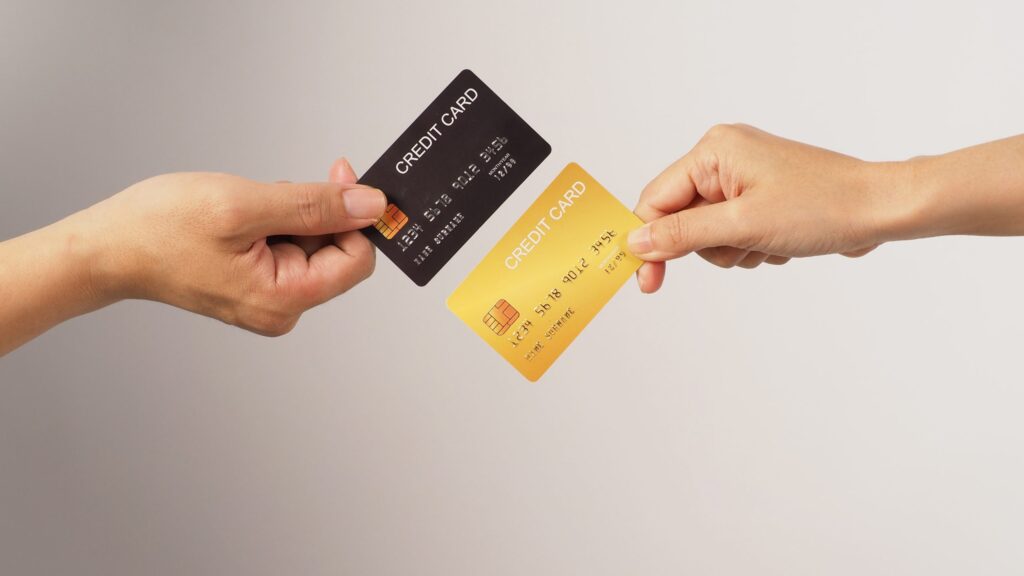Anúncios
Have you ever faced the variety of credit cards available in the market and felt lost amidst the options? Selecting the appropriate credit card holds significant weight as it directly impacts your financial well-being.
In this article, we will explore the different aspects to consider when selecting a credit card that aligns with your preferences and needs.
Select the credit card that best suits your preferences:
As you set out to discover the perfect credit card for your needs, it’s essential to assess your own preferences and financial requirements carefully. Take the time to prioritize and understand what matters most to you before diving into the realm of credit cards.
Consider every detail, as they can add significant value to your choice. After all, a credit card decision is not only a matter of credit but also a lifestyle choice.
Anúncios
What is a credit card, and how does it work?
A credit card is a financial tool that provides a line of credit to the cardholder, allowing them to make purchases and transactions even without having the money immediately available.
It operates as an electronic payment instrument, providing convenience and flexibility in day-to-day transactions.
The cardholder can use the card to purchase in physical or online stores within the established credit limit.
Anúncios
Transactions made throughout the month are recorded in a monthly statement. The cardholder receives the statement detailing the expenses, due date, and the total amount owed.
Cardholders are given the choice to either settle the entire balance or opt for a minimum payment. If the full amount is not paid, interest is applied to the unpaid balance. Additionally, there may be additional fees, such as an annual fee, varying based on the card type.
In summary, a credit card is a versatile financial tool that provides flexibility in transactions, but its use requires responsibility.
What are the different types of credit cards?

Credit cards are available in diverse forms, tailored to address the unique requirements and desires of consumers. Now, let’s delve into the primary categories of credit cards offered in the market:
- Traditional Cards: Standard credit cards suitable for daily use in purchases and transactions.
- Rewards Cards: Designed to reward cardholders for their spending, offering points, air miles, cashback, or other specific benefits.
- Cashback Cards: Return a percentage of the amount spent as a credit on the statement or deposited into the account.
- Travel Cards: Ideal for travel enthusiasts, offering benefits such as air miles, access to airport VIP lounges, travel insurance, and no international transaction fees.
- Student Cards: Designed for university students, often with lower credit limits and rewards tailored to student lifestyles.
- Secured Cards: Recommended for those with limited or negative credit history, requiring a deposit as collateral.
- Business Cards: Intended for business owners, offering benefits focused on business expenses.
- Premium or Luxury Cards: For high-income consumers, providing exclusive benefits like airport lounge access and 24-hour concierge service.
Choosing the right type of credit card depends on individual preferences, lifestyle, and financial needs.
By understanding the available options, consumers can select a card that best meets their expectations and maximizes the associated credit benefits.
What is a credit score, and how does it affect my credit card selection?
The approval and terms of your credit card hinge significantly on your credit score. It reflects your financial history and responsibility in repaying debts.
Understanding how credit scores are calculated and how they influence card offers can guide your choices. Sometimes, improving your credit score before applying for a card can result in better terms.
When selecting a credit card, what aspects should I take into account?
Selecting the appropriate credit card involves more than just evaluating the initial offers’ surface appeal. It is a conscious decision that requires carefully evaluating various factors directly impacting your finances.
In this guide, we will explore the crucial elements to consider when choosing a credit card, ensuring that your choice aligns with your financial needs and goals.
Annual fee
Many credit cards have an associated annual fee, and it is crucial to assess whether the card’s benefits justify this additional expense.
Cards with higher annual fees often offer more robust rewards and benefits. However, if you seek simplicity, no-annual-fee options may be more suitable.
Interest rates
Interest rates, especially those applied to unpaid balances, can significantly impact your finances.
Evaluate the card’s interest rates, especially if you plan to carry a balance regularly. Opting for a card with a lower interest rate can save money in the long run.
Credit limit
The credit limit establishes the uppermost amount allowable for expenditures using the card. Choose a limit that aligns with your needs, avoiding exceeding your budget. Remember that a higher credit limit does not automatically mean you should spend more.
Other fees
Apart from the annual fee, it’s important to examine additional fees linked to the card, including late payment charges, cash advance fees, and international transaction fees. Knowing these fees is vital to avoid unpleasant surprises.
What are the advantages and disadvantages of using a credit card?

The use of credit cards has become an essential part of modern financial life. However, like any financial tool, credit cards have advantages and disadvantages that should be carefully considered.
Advantages:
- Convenience and Ease of Use: To complete the transaction, simply tap or insert the card. This is especially useful in emergencies or online purchases.
- Rewards and Benefits: Turns your expenses into opportunities for savings or additional gains. These benefits may include travel discounts, accumulated points for future purchases, and more.
- Transaction Security: Fraudulent transactions can often be contested and reversed, providing a sense of security to cardholders.
- Building Credit History: Responsible use of the credit card is an effective way to build and strengthen your credit history.
- Interest-Free Grace Period: If the total balance is paid in full by the due date, you can use the card’s money temporarily without financial charges.
Disadvantages:
- Accumulation of Debt: If not used responsibly, the unpaid balance can quickly grow, resulting in significant interest charges.
- Fees and Financial Charges: Ignoring fees can lead to additional financial costs.
- Temptation for Excessive Spending: The ease of using credit cards can lead to the temptation to spend more than planned.
- Impact on Credit Score: Irresponsible use of the card, such as late payments or exceeding the credit limit, can harm your credit score.
How to use a credit card responsibly?
When utilized responsibly, a credit card can be a beneficial instrument for financial oversight. Nevertheless, the risk of accruing debt and unwarranted expenses also exists. Therefore, before using your credit card, establish a monthly budget.
Know your essential expenses, savings goals, and discretionary spending. This will help avoid impulsive spending.
Whenever possible, pay the full amount of the statement before the due date. This avoids the accrual of interest and financial charges. If it is impossible to pay the full balance, strive to pay as much as possible, minimizing the long-term financial impact.
Carefully review the terms and conditions of your credit card. Understand the associated fees, offered benefits, and due dates.
Establish monthly spending limits for your credit card. This will help avoid overspending and ensure that you stay within your budget. If necessary, use financial management apps.
Numerous credit cards provide perks like rewards programs, travel insurance, and extended warranties on purchases. Be aware of these benefits and take advantage of them when applicable.
Establish the habit of regularly checking your transactions. This not only helps identify potential fraudulent activities but also keeps you aware of your spending history.
By incorporating these practices into your routine, you can turn your card into an effective tool for building credit, enjoying benefits, and maintaining control over your finances.
Remember, the goal is to use the card as an ally, not as a source of debt. With a conscious approach, you will be on the right path to healthy and balanced financial management.
How to protect my credit card information?
The security of your credit card information is an essential priority in a digitized world. With rising threats of fraud and cybercrimes, it is crucial to adopt effective practices to protect your financial information.
- Keep Your Information Confidential: Never share your credit cards details, such as the number, expiration date, and security code (CVV), unless in a secure environment and for a legitimate purpose.
- Use Secure Sites for Online Transactions: Ensure that the websites where you make online transactions are secure. Look for URLs starting with “https://” and a padlock icon in the address bar.
- Protect Your Electronic Devices: Keep your computer, smartphone, and other electronic devices protected with up-to-date antivirus and antimalware software.
- Create robust and distinct passwords for your online accounts, including those associated with your credit card.
- Regularly Monitor Your Transactions: Establish the habit of regularly reviewing your credit card statements.
- Activate Alerts for Suspicious Transactions: Enable email and SMS alerts to be instantly notified about suspicious activities.
- Avoid Public Wi-Fi Networks: Avoid conducting financial transactions or accessing sensitive information on public Wi-Fi networks.
- Report Immediately in Case of Loss or Theft: If you lose your credit card or suspect unauthorized activities, contact the card issuer immediately to block or cancel the card.
Ensuring the security of your credit card details is a continuous obligation. By adopting robust security practices, you significantly reduce the risk of fraud and identity theft.
We offer various credit card options for you to explore and choose the one that suits you best. So, access the article below and discover everything about the Mission Lane Visa Credit Card.